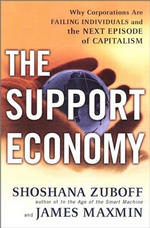|
This is my dynamic, frequently updated homepage. This is a NewsLog, also known as a WebLog or Blog.
Everything is evolving, so don't assume too much.
People to watch:
Adina Levin
Andrius Kulikauskas
Britt Blaser
Catherine Austin Fitts
Chris Corrigan
Clay Shirky
Dan Gillmor
Dave Pollard
David Allen
David Weinberger
Dewayne Mikkelson
Dina Mehta
Doc Searls
Elisabet Sahtouris
Elizabeth Lawley
Euan Semple
Florian Brody
Frank Patrick
Gen Kenai
George Dafermos
George Por
Graham Hancock
Greg Elin
Hazel Henderson
Heiner Benking
Inspector Lohman
Jean Houston
Jerry Michalski
Jim McGee
Jim Moore
John Abbe
John Perry Barlow
John Robb
Joi Ito
Jon Husband
Jon Lebkowsky
Jon Udell
Jonathan Peterson
Judith Meskill
Julian Elvé
Julie Solheim
Kevin Marks
Lawrence Lessig
Leif Smith
Letecia Layson
Lilia Efimova
Lisa Rein
Marc Canter
Mark Oeltjenbruns
Mark Pilgrim
Mark Woods
Martin Dugage
Martin Roell
Mary Forest
Matt Mower
Max Sandor
Michael Fagan
Mike Owens
Mikel Maron
Mitch Kapor
Mitch Ratcliffe
Nathalie dArbeloff
Netron
Noam Chomsky
Paul Hughes
Peter Kaminski
Phil Wolff
Philippe Beaudoin
Ray Ozzie
Raymond Powers
Rebecca Blood
Roger Eaton
Roland Tanglao
Ross Mayfield
Scott Lemon
Sebastian Fiedler
Sebastien Paquet
Skip Lancaster
Spike Hall
Steven Johnson
Stuart Henshall
Thomas Burg
Thomas Madsen-Mygdal
Thomas Nicholls
Timothy Wilken
Todd Suomela
Tom Atlee
Tom Munnecke
Tom Tomorrow
Ton Zijlstra
Lionel Bruel
Loic Le Meur
Nancy White
Mark Frazier
Merlin Silk
Robert Paterson
Colby Stuart
Nova Spivack
Dan Brickley
Ariane Kiss
Vanessa Miemis
Bernd Nurnberger
Sites to watch:
Electronic Frontier Foundation
Co-intelligence Institute
Free Expression Network
Collective Intelligence
Action without borders
Manufacturing Dissent
Explorers Foundation
Disclosure Project
ThoughtsOnThinking
Forbidden Science
Emergent by Design
Greater Democracy
Global Ideas Bank
Independent Media
Space Collective
Friendly Favors
Escape Velocity
Disinformation
Collective Web
WorldChanging
YES Magazine
Disinfopedia
NotThisBody
MetaFilter
Webcamorama
BoingBoing
Smart Mobs
Do No Harm
Imaginify
FutureHi
Openworld
Nanodot
HeadMap
Rhizome
Absara
Edge
Junto
French:
Emmanuelle
Manur
Elanceur
Loeil de Mouche
IokanaaN
Blog d'Or
Le Petit Calepin
GeeBlog
Absara
Guillaume Beuvelot
Ming Chau
Serge Levan
Jean Michel Billaut
C'est pas Mécanique

I live in Toulouse, France where the time now is:
01:08
Unique Readers:

Primarily
Public Domain
Everything I've written here is dedicated to the
Public Domain.

The quotes from other people's writings, and the pictures used might or might not be copyrighted, but are considered fair use. Thus, overall, this weblog could best be described as being:
Primarily Public Domain. |
Syndication:
 ![Validate my RSS feed [Valid RSS]](http://www.newciv.org/pic/valid-rss.png)
|
| Monday, December 23, 2002 |  |
|
|
|
 Timothy Wilken writes: Timothy Wilken writes:"Today, mind and brain scientists have made enormous progress in understanding how the human brain works. There has been many surprises in these recent advances. But the biggest shocker is that the brain doesn't decide what to do. Decision making is not controlled centrally in the brain. The mind-brain appears to act as a coordination and consensus system for all the cells, tissues, and organs in the body. The brain doesn't decide to eat. The cells of the body decide to eat, the brain coordinates their activity and carries out the consensus will. Our human brain stores the gathered information from the body's sensing of its environment, the brain presents opportunities for action reflective of both the sensing of environment and the needs and goals of the 40,000,000,000,000 cells it serves. The brain is not the leader of the body, it is the follower of the body. It is a system that matches needs in the body with its sensing of opportunities to meet these needs by action within the environment. The brain is a 'government' that truly serves its constituents– the cells, tissues, and organs that make up the human body. The apparent " I " is not real. It is really a " We ". ... If the human body can using unanimous rule democracy and synergic consensus can organize and coordinate the actions of 40 trillion cells so totally that we identify the whole organism as a single individual, then we humans should be able to use these same mechanisms to organize our species and solve our human problems..."
[ Knowledge | 2002-12-23 03:17 | | PermaLink ] More >
|
|
|
|
 Buckminster Fuller defining wealth: Buckminster Fuller defining wealth:"Wealth is the performance per pound utilization of the world's resources. It is the number of forward days that the number of people on earth can live at an increasingly higher standard of living without the negative effects of environmental pollution." Here's another version:"Intellect and energy; measured by the amount of forward days for how many humans with which we are technically organized to cope. Because energy can neither be destroyed nor created, and 'know-how' of intellect can only increase with each experiment, or experience, wealth consisting of both the physical and metaphysical can only increase with each and every re-employment."
[ Knowledge | 2002-12-23 04:08 | | PermaLink ] More >
|
|
|
|
USA
1. Honeywell (rockets, chemical)
2. Spectra Physics (chemical)
3. Semetex (rockets)
4. TI Coating (atomic, chemical)
5. Unisys (atomic, chemical)
6. Sperry Corp. (rockets, chemical)
7. Tektronix (rockets, atomic)
8. Rockwell (chemical)
9. Leybold Vacuum Systems (atomic)
10. Finnigan-MAT-US (atomic)
11. Hewlett-Packard (atomic, rockets, chemical)
12. Dupont (atomic)
13. Eastman Kodak (rockets)
14. American Type Culture Collection (biological)
15. Alcolac International (chemical)
16. Consarc (atomic)
17. Carl Zeiss - U.S (chemical)
18. Cerberus (LTD) (atomic)
19. Electronic Associates (rockets)
20. International Computer Systems (atomic, rockets, chemical)
21. Bechtel (chemical)
22. EZ Logic Data Systems, Inc. (rockets)
23. Canberra Industries Inc. (atomic)
24. Axel Electronics Inc. (atomic)
Britain
1. Euromac Ltd-Uk (atomic)
2. C. Plath-Nuclear (atomic)
3. Endshire Export Marketing (atomic)
4. International Computer Systems (atomic, rockets, chemical)
5. MEED International (atomic, chemical)
6. Walter Somers Ltd. (rockets)
7. International Computer Limited (atomic, chemical)
8. Matrix Churchill Corp. (atomic)
9. Ali Ashour Daghir (atomic)
10. International Military Services (rockets) (owned by the British Ministry of Defence)
11. Sheffield Forgemasters (rockets)
12. Technology Development Group (rockets)
13. International Signal and Control (rockets)
14. Terex Corporation (rockets)
15. Inwako (atomic)
16. TMG Engineering (chemical)
17. XYY Options, Inc (atomic) And so on and so on and so on. Who sold what to Iraq, as contained in the Iraqi arms declaration, brought to you by Andreas Zumach of Die Tageszeitung. The article also lists French, Chinese, Russian, Japanese, Dutch, Belgian, Spanish and Swedish companies. Zumach's articles are available in English here, in the original at taz.de; and there's an interview with Zumach at Democracy Now! [from randomWalks]
[ Politics | 2002-12-23 16:05 | | PermaLink ] More >
|
|
| Sunday, December 22, 2002 |  |
|
|
|
 The photo on the right is by Leonard Nimoy, aka Mr. Spock. Arcticle on salon.com about his love for photographing naked women. The photo on the right is by Leonard Nimoy, aka Mr. Spock. Arcticle on salon.com about his love for photographing naked women.
But that wasn't really my point. I'm trying to practice thinking like an entrepeneurial capitalist, so I'm looking for grassroots things people do to set up businesses. If you go to Google and look up "naked women", the first site you get is this site, which has no naked women at all, but it is a little joke page, with a button you can't quite seem to get to click on. And the programmer's page is linked in small print way at the bottom. My point is, he's probably making good business just from that one little link.
But it is better to do something actually useful. See Gizmodo. It is a site for gadget freaks. Everything cool and new in electronic gizmos, information and reviews, in a pleasant and neutral format. But there are some links for being able to buy some of the stuff too. From what I hear those guys are doing well with that. On the order of paying somebody $1K/month for doing writing, and bringing in $5K/month in commissions from the online stores they send people to. Perfect. Everybody's happy.
Several people figured out that they could make a list of the top books mentioned most often in the thousands of weblogs updated recently. Nice service. Shows where people's attention are. But it is also a great little way of making some extra money without anybody having any problem with it. See, the people who compile those lists (using automated programs) will also add their own amazon.com affiliate code to all the links, which means they will get a percentage of any purchases of those books. That certainly doesn't bother anybody.
I use that too if I link to books at Amazon. So, if you right now go and pre-order your new Segway Scooter for 2003 delivery, I'll get a nice commission. Order one for me too now you're at it.
[ Inspiration | 2002-12-22 23:56 | | PermaLink ] More >
|
|
|
|
Doc Searls, answering Eric Norlin who was ranting against all the new agey hippie webloggers who think that there is something inherently free and socially just and evolutionary about the Internet, and who himself seemed to think the Net is just like anything else: about making money and whatever other self-gratifying activities people are already into.
Doc: "Well, I guess I'm one of those NewAgers, but I'm an OldAger too, and the crank in me agrees completely. The Net is a new world. You can do all kinds of stuff on it, and with it. ALL kinds. Exclude nothing, because it'll happen. Worlds are like that.
About making money. Ever asked yourself what the business model of rocks is? Of dirt? Of trees? Of rotted plants? Of reproductive urges? Last I looked the building, concrete, lumber, oil and porn businesses were doing pretty well. The difference with the Net is: its resources are infinite. They don't need to be renewed, because they're not scarce. You mine and harvest them by processes like duplication. Take all you want; just don't buy the illusion that you "own" any of it. You don't, any more than you own the air you breathe or the jillion-ton wedge of rock and lava between your yard and the core of the Earth. Deep down, it's a commie kinda place. Deal with it.
Think of the Net as a laboratory for human nature, because it's the first world entirely made by human beings. And as Craig Burton says, we've only begun to terraform it. It's like we created a parallel planet, occupying the same space and time as the one we already inhabit. We're there already and have to make the most of it. Including the fact that some of our founding dreams were wet."
[ Organization | 2002-12-22 23:56 | | PermaLink ] More >
|
|
|
|
The most linked article in weblogs today is Coffee, Tea, or Should We Feel Your Pregnant Wife’s Breasts? at Kuro5hin. It is presented as a tale of some ordinary decent people who get grossly mistreated in an airport by a fascist police state, for no reason at all, and he gets thrown in jail and she develops complications in her pregnancy. Well, I read it, and I'd otherwise be the first to complain about the violations of human liberty and rights to privacy going on in the United States right now. But, even reading the guy's own account, it sounds more like a self-centered macho guy with a big anger problem.
The security checks at U.S. airports are very annoying, and it is very questionable if they'll make much difference in hindering terrorist attacks. I made the mystake myself of flying to Las Vegas recently from L.A., rather than driving. Each way they twice pulled me aside to meticulously go through everything I was carrying and wearing. Taking off my shoes, patting over my body, locating my nail clipper, etc. It might or might not all make sense, but there's a point to it, and it certainly wasn't the personnel at the gate who came up with those policies. And everybody's a bit on edge. So, the very wrong thing to do is what that guy did. Refuse to take your hat off, because you can't see why you should have to. When they find the scissors in your bag, and they point out that you aren't allowed to bring scissors, you jump up and yell "What the fuck! What kind of shit is that?!?" Yeah, that'll help. And when your pregnant wife is crying after having gone through the same thing, you don't comfort her, but you stomp over and try to start a fight with the people who had checked her. The result is very predictably that they'll take you away in handcuffs, but that they'll later look quite leniently on it after things have calmed down, and it was obvious that you were being protective of your pregnant wife who was vulnerable, and you for some reason didn't understand what was expected of you. It has nothing to do with whether your rights are violated because somebody has the audacity to think you might have a bomb in your hat or around your waist or under your skirt or in your shoe. Indeed, it is people like you who are most likely to think they have a reason to. People who carry anger with them wherever they go.
[ Politics | 2002-12-22 23:59 | | PermaLink ] More >
|
|
| Saturday, December 21, 2002 |  |
|
|
|
 While discussing xpertweb, an interesting system for connecting people with experts through a peer economy, Britt Blaser mentions, amongst several problems with real-world reputation systems: While discussing xpertweb, an interesting system for connecting people with experts through a peer economy, Britt Blaser mentions, amongst several problems with real-world reputation systems:"People no longer work for a living. They hold jobs for a living, which pays better. ..which sort of got me thinking. That isn't just a flippant thing to say. I have a hard time thinking of anybody who really works for a living. When I have work that needs doing, I have a hard time finding anybody who would like to do it, even for money. And, I must admit, I don't really have time to work either. There's nothing I'm available for that you can just come and pay me for and I'll do it. And, looking around me, a lot of people seem to work that way. OK, I can still go and get a haircut and pay for it, and I pretty much know what I'll get. But that kind of thing is becoming more rare.
The times I have been employed by corporations I was always puzzled by the fact that most people weren't really doing anything terribly productive, and it made relatively little difference what amount of work people actually were putting out. I several times had the task of making a computer system that would automate what a certain company was doing, so I specifically had to study what it was that actually took place. And along the way I noticed how rather little it had to do with doing work and accomplishing finished work. For example, it is with some embarrassment I note that I once hired a guy to document a program I had written. He had an impressive resume, and the company had to pay above the norm to acquire him. After a year he left to join a big consulting company, and everybody shook his hand and congratulated him on his great career move and his excellent service to the company. I and everybody else knew, at least via our peripheral vision, that the tangible product of his 1 year of work was 1/2 written page of a suggested outline for the manual. We're talking about an expense of maybe $70K for 1/2 page of writing, which I could just as well have jotted down in five minutes instead of hiring him. But nobody cared, because none of it really matters that much. The company was busy and the organizational chart looked good and the money flowed somehow. And this guy had great relationships with everybody. He was very supportive. I enjoyed working with him.
It is not all crazy. The point is that it is relationships people want, rather than giving or receiving quantities of work. And in some mysterious way, that's actually working. With the people I work for today, I'm an independent contractor, but I've insisted on arrangements where I get paid fixed amounts of dollars per month, but I don't promise any hours of work, and there are no deadlines or anything like it. If they or I are unhappy, we'll change the amount or stop the agreement. But it is not about work. It is about paying attention. It is about being present for whatever comes along in a certain area.
I have not yet myself learned to be comfortable with that in situations where I'm the person who's needs some work done. I can see how it ought to work, but it just hasn't become intuitive yet for me. The point is of course that it needs to be a mutually beneficial relationship. I pay attention to these things, and you pay attention to those things, and together we're better off somehow. It is not about me forcing you to deliver certain goods at a certain price. The world is changing rapidly and the future is uncertain, so maybe the relationship model is more viable than a transaction model. But, of course, it needs to be a good relationship, not a bad one.
[ Organization | 2002-12-21 23:59 | | PermaLink ] More >
|
|
|
|
 The Publishers Weekly review of the book "The Support Economy: Why Corporations Are Failing Individuals and The Next Episode of Capitalism" says: The Publishers Weekly review of the book "The Support Economy: Why Corporations Are Failing Individuals and The Next Episode of Capitalism" says:"Over the last two centuries, they argue, an increasingly efficient economy, coupled with a rise in democratic thinking and growing access to information, has opened up life's possibilities to increasing numbers of people. Because participation in the consumption-based economy is unavoidable, the general public looks to markets to provide 'deep support' in their quest for individualization, but 'are routinely punished for being complex psychological individuals in a world still fitted out for the old mass order.' This macroeconomic structure treats people as either employees or consumers and inevitably hurts their feelings. Zuboff and Maxmin would eliminate the 'little murders' of customer service interaction by replacing the current transaction-based model with a form of 'distributed capitalism' based on a customer-supplier relationship, so semi-anonymous customer service reps will be replaced by 'advocates' fully emotionally involved in their clients' needs." I like that. Its gotta happen. The economic value of actually caring about giving people what they want - it must somehow turn out to be higher than the value of tricking or mistreating people into paying too much for things they don't really want. Sooner or later.
[ Organization | 2002-12-21 23:59 | | PermaLink ] More >
|
|
|
|
On the xpertweb site you find a manifesto aimed at providing "Value Chains for the Rest of Us". To explain:"Value Chains are the means by which originators get rich in a market economy — they are combinations of producers, distributors, middlepeople and retailers.
Value Chains have always been hard to forge, defend, manage and collect from, which is why they're so profitable. The Internet is poised to combine productive individuals into value chains which reward their participants as richly as traditional value chains." OK, I get it. Anyway, read the actual document. Much good stuff like:"The Internet is a conversation.
And that Markets are conversations, as described by the folks at ClueTrain.
Work and its Reward is primarily a conversation about quality: money is just the punch line.
The quality of the work-reward conversation, not money, is the best benchmark for a 'New' Economy.
Internet protocols are the best model for a quality-based, more even-handed Economic Operating System.
Establishing a quality-based Economic OS requires no new laws, technical standards or protocols, so it needs nobody's permission..."
[ Organization | 2002-12-21 23:59 | 0 comments | PermaLink ]
|
|
|
|
Andrius Kulikauskas and David Ellison-Bey have many thoughts in this paper about economies based on giving.
"Wealth is relationships. In what sense is this true? If you have relationships, then you can get a loan, an education, a job, timely ideas, opportunities. Whereas knowledge is worthless out of context. Even money is worthless if there is nobody to take it, that is, if there is no web of relationships to back up the currency.
If you are poor, then you lack relationships, you must be 'out of the loop'. But if we can bring you 'into the loop', help you form social connections, integrate you into the economy, then we are creating wealth. This suggests that a business might sustain itself, fight poverty and create wealth by integrating people into the economy...
[ Organization | 2002-12-21 23:59 | | PermaLink ] More >
|
|
| Friday, December 20, 2002 |  |
|
|
|
 Evolutionary biologist Elisabet Sahtouris is one of the most inspiring people I know, and she holds an important key - the understanding of living systems, and how that understanding applies in many places we might not expect. Evolutionary biologist Elisabet Sahtouris is one of the most inspiring people I know, and she holds an important key - the understanding of living systems, and how that understanding applies in many places we might not expect."A biology that sees all nature as co-evolving holons (living entities) in holarchies (interdependent embeddedness) will quickly reveal much about humanity itself as one such holon - containing its own holarchy of individuals, families, organizations, communities, nations and world. Through this understanding of ourselves, we will gain profound insights on where we succeed and where we fail as a living system." --Biology Revisioned
"We are learning that there is more than one way to organize functional systems, to produce order and balance; that the imperfect and flexible principles of nature lead to greater stability and resilience in natural systems than we have produced in ours-both technological and social-by following the mechanical laws we assumed were natural...On the whole, there seems to be good reason to believe our species' recklessly egotistical and destructive phase is coming to an end with new knowledge that leads us back to ancient wisdom. We are capable of regaining our reverence for life, of replacing the drive to conquer with the will to cooperate, of remaking our engineered institutions, including our corporations, into living systems." --Earthdance
[ Nature | 2002-12-20 06:03 | | PermaLink ] More >
|
|
|
|
The Bush administration apparently has a plan for building a centralized system to enable broad monitoring of the Internet, and, potentially, surveillance of its users, through arrangements with ISPs. The proposal is part of a final version of a report, 'The National Strategy to Secure Cyberspace', set for release early next year.Mitch Ratcliffe says, and I agree: "This is sheer idiocy, because it will actually increase the risks to the national information infrastructure. From its inception, the Net was conceived as a distributed system that could reorganize around failures (in the case of the original designs, the Net was built to route around damage caused by nuclear weapons). Centralizing all network communications to facilitate surveillance will create a huge, ripe and easily attacked target, reducing the reliability and performance of the Internet on the whole and for each individual user. Likewise, the plan would invade the digital borders of other countries, creating many conflicts that don't impede communication today." Well, if it happens, we'll have to route around that particular damage. The U.S. could no longer be allowed to contain the central hubs of the Internet, and we'll just have to encrypt more traffic. ... Note: the next day the White House issued a clarification, saying the plan is not finished and it will not necessarily include monitoring of individual e-mail. Yeah, sure.
[ Technology | 2002-12-20 15:02 | | PermaLink ] More >
|
|
|
|
The U.S. Immigration and Naturalization Service has arrested close to 1000 Middle Eastern immigrants in Los Angeles, after tricking them into voluntarily coming in to register. That's not good, and it is looking a bit like how the U.S. imprisoned Japanese Americans during WWII in 'internment camps'. Lisa Rein has a bunch of things to say about it. Well, I can see the other side too, not that it is reasonable or pretty or anything. The U.S. immigration system is a hugely screwed up bureaucracy. People are still being processed based on boxes of paper, and each step typically takes several years, no matter how simple it is. My wife and my daughter only got their greencards last year, and that took 9 years for a simple formality, as they had a right to immigrate because I already had a greencard. In the meantime they could, in principle, have been arrested and deported. But the immigration system has an unwritten racial bias here. People from Mexico, or people from the Middle East, would most likely be deported if arrested. But if my wife had been arrested, we could probably have talked our way out of it, with the help of a laywer, as we don't look like illegal immigrants. Anyway, the bureaucracy is so huge and stupid here, and there are so many holes in the societal control system here, that it looks very feasible for people to just stay here after your visa expires. And that's what happened with those 1000 Iranian people. They live here, but they didn't have valid visas, and some of them had applied for greencards, but they weren't really in any legal category. So, yes, when they walk into the INS, they will recognize of course that these people don't have any legal visas, and they will arrest them. But the whole thing got to look quite a bit like a setup, in order to cart Muslims off to concentration camps.
[ Politics | 2002-12-20 15:33 | 0 comments | PermaLink ]
|
|
|
|
 Johnny Carson: "Democracy is buying a big house you can't afford with money you don't have, to impress people you wish were dead. And, unlike communism, democracy does not mean having just one ineffective political party; it means having two ineffective political parties. ... Democracy is welcoming people from other lands, and giving them something to hold onto -- usually a mop or a leaf blower. It means that with proper timing and scrupulous bookkeeping, anyone can die owing the government a huge amount of money. ... Democracy means free television, not good television, but free. ... And finally, democracy is the eagle on the back of a dollar bill, with 13 arrows in one claw, 13 leaves on a branch, 13 tail feathers, and 13 stars over its head -- this signifies that when the white man came to this country, it was bad luck for the Indians, bad luck for the trees, bad luck for the wildlife, and lights out for the American eagle. I thank you." Johnny Carson: "Democracy is buying a big house you can't afford with money you don't have, to impress people you wish were dead. And, unlike communism, democracy does not mean having just one ineffective political party; it means having two ineffective political parties. ... Democracy is welcoming people from other lands, and giving them something to hold onto -- usually a mop or a leaf blower. It means that with proper timing and scrupulous bookkeeping, anyone can die owing the government a huge amount of money. ... Democracy means free television, not good television, but free. ... And finally, democracy is the eagle on the back of a dollar bill, with 13 arrows in one claw, 13 leaves on a branch, 13 tail feathers, and 13 stars over its head -- this signifies that when the white man came to this country, it was bad luck for the Indians, bad luck for the trees, bad luck for the wildlife, and lights out for the American eagle. I thank you."
[ Politics | 2002-12-20 15:53 | | PermaLink ] More >
|
|
|
|
I was sort of thinking I was way behind on implementing features in my newslog program here, which other weblog programs had long ago. But I just noticed Doc Searls saying:"Blogging is basically just writing live on the Web. There are lots of upsides to it, as we know. But there's at least one downside: saving stuff. When you're writing for yourself, you save constantly. But when you're writing live, for the world, you don't always want to do that. You might want to wait until you're done with your post before you save it. That's risky. ... as I just found out when I wasted twenty minutes I didn't have answering Eric Norlin's latest volley, point by point. I was up to number 5 out of 6 when something "unexpectedly quit" and I lost it all." Sorry to hear that, but, hahah, MY newslog program has a button for saving a draft while one is going along, and one can also leave a post hidden and saved for later publishing. Because I too absolutely hate loosing stuff I just wrote. So, maybe I do have a few things that others don't have. Like, the picture management system for this program is quite simple, but powerful and useful. Many weblog programs require people to know HTML to include links and pictures, and you would be on your own in terms of uploading the pictures somewhere.
[ NCN | 2002-12-20 16:10 | | PermaLink ] More >
|
|
| Thursday, December 19, 2002 |  |
|
|
|
 I was listening to a tape by anthropologist and shaman Hank Wesselman, of a session I missed at the Prophet's Conference, and he introduced a shamanic journey and started drumming. The idea was that one would go to one's garden in the dreamworld and receive some wisdom or meet somebody. I stopped the car, and sat in the dark. I was listening to a tape by anthropologist and shaman Hank Wesselman, of a session I missed at the Prophet's Conference, and he introduced a shamanic journey and started drumming. The idea was that one would go to one's garden in the dreamworld and receive some wisdom or meet somebody. I stopped the car, and sat in the dark.
My garden had a waterfall and a jungle and a lot of land to explore, and caves. I went into a cave which went down, taking several turns and forks. There I had a vision, in the form of a multi-dimensional lightshow of sorts. It is hard to describe, but there was a mirror effect going off into several dimensions at the same time. Almost a thru-the-lookingglass thing in several directions. You can't reflect yourself in a mirror without having, well... a reflection. Action and Reaction, or rather, both at the same time. And there seemed to be some wisdom there, applying to knowledge and how to organize it.
As I came out of it, sitting in the dark, I still didn't quite get it, but I figured I'd better write it down, as it might fall into place later. But what I think of right away is: information is usually disconnected from what it is about. You write or talk about something or someone, and they don't necessarily know, and there's no mechanism for ensuring it is valid or useful. If they move or change, your words don't move or change with them. But in a way, they should. Our information is often like pieces of paper we crumble up and throw in the general direction of what we're talking about. But it should really be like rubber bands attached to what we're talking about, stretching and following. A two-way link. Is that maybe a difference between information and knowledge? Information is disconnected and static, but knowledge is connected and fluid? If you move, the reflection in the mirror moves. If you walk away, the reflection walks away. But there are many mirrors we're reflected in simultaneously, so as we walk away from one, we might get closer in another.
[ Knowledge | 2002-12-19 01:40 | | PermaLink ] More >
|
|
|
|
Alex Halavais talks about an experiment with a karma/reputation system in a class he was teaching. The idea being that one had a certain number of points, and one could give them to others for doing good deeds, according to a simple system. But people cheated and the system fell apart.
I've noticed myself that it is rather difficult to make a functional reputation system. There is one in NCN, where people mark others as being 'acquaintances', 'friends' or 'comrades', meaning that they're somewhere on a scale between 'I know them' and 'I would trust them with my life'. Some of the problems I've noticed are:
- People have different norms. Some people feel they trust everybody unconditionally.
- Many people feel obliged to be reciprocal, even if they don't quite mean it.
- Some people try to have several virtual personalities, so they can give each other points.
- If there is a list of people's reputation ratings as numeric values, ordered in descending numeric order, people change their behavior and get competitive about getting better numbers.
- If I made the system, and I'm first on the list, people get suspicious.
- People who are very active get high ratings
- Some people end up hating reputation systems
Aside from that, it works fairly well. I just think I need to get rid of the comparative listing.
[ Organization | 2002-12-19 03:58 | | PermaLink ] More >
|
|
|
|
 BigCat talks about the Mood of the Blogosphere: BigCat talks about the Mood of the Blogosphere:"I'm not sure if this is a rehash of an old idea, an improvement to it, or something totally useless, but here goes:
j-mo talks about wanting her blog to immediately express her mood. Lots of people have various icons on their entries on Live Journal and other places to show current mood.
It always seems that some days are bad mood days for lots of people. This time of year often has a lot of those days.
The idea of measuring this is a little like imood and their "mood of the Internet" - but that is a single service that you have to register for. I don't really think that scales very well. It seems like an open system that all could use for whoever they wanted to would be better.
What I'm thinking about is a standard XML tag that could be read by the various RSS aggregators and such (read Scripting News and the links there if you are interested in more about this).
This could also be worked into blogging software - set your mood and it sets the styles or whatever you want automatically.
Anyone could them compile a "mood" index for the part of the world that interested them - ranging from just their friends to everyone listed in one of the big indexes..." Hm, yeah. It is just that I wouldn't be happy with simple moods like 'happy','sad' and 'tired'. For me it is more that different times have a different energy. Some days are for lying in your bed reading comic books. Other days are high energy days for getting something done. I don't always pay attention to that, so sometimes I go against the flow, and try to make something happen that just isn't gonna happen on such a day. But, yeah, I'd like some way of flagging it, or noticing it collectively.
[ Patterns | 2002-12-19 04:12 | | PermaLink ] More >
|
|
|
|
 NY Times reports that a naive psychology researcher at Harvard advertised for people who had been 'contacted or abducted by space aliens', thinking that it would be a great way to find a few suggestible weirdos who were out of touch with reality, so that she could study how fabricated memories work. Instead she got overwhelmed, both with responses from lots of people with abduction experiences to tell about, and then from people ridiculing it, and finally from fellow Harward researchers who actually had been studying the phenomenon. NY Times reports that a naive psychology researcher at Harvard advertised for people who had been 'contacted or abducted by space aliens', thinking that it would be a great way to find a few suggestible weirdos who were out of touch with reality, so that she could study how fabricated memories work. Instead she got overwhelmed, both with responses from lots of people with abduction experiences to tell about, and then from people ridiculing it, and finally from fellow Harward researchers who actually had been studying the phenomenon.
For the record, I have memories of being abducted by aliens as well, and I frequently had nose bleeds as a child. And I'm not a particularly suggestible or gullible person. But I don't have much urge to convince anybody about what is real and what is not. I think our universe is big and mysterious, and there is a lot of things we haven't really figured out yet about how reality works, so sometimes it is best to keep an open mind and reserve judgment for later.
As to the fabricated memory thing that the Harvard doctor was researching, yes, as a counselor and a certified hypnotherapist myself, I agree that this can be quite a problem in a therapeutic setting. Particularly when it comes to recovered memories of childhood sexual abuse. I think that can possibly happen, but it might just as well be something else. Just because one remembers it, doesn't necessarily mean it physically happened that way. I've had clients who suddenly remembered childhood molestation, where I must admit I didn't quite believe it. It can be very productive to work on the issues related to that, regardless, but it is very problematic if the client considers making the jump to go home and actually confront somebody with what they supposedly did 30 years ago, if all you have is some suddenly recovered memories. Bad idea. Processing it emotionally and mentally versus acting on the reality of it in the material world are two different things.
[ Culture | 2002-12-19 04:26 | | PermaLink ] More >
|
|
| Wednesday, December 18, 2002 |  |
|
|
|
Philippe Beaudoin has some good thoughts about weblogs as meta search engines. Rather than just directly looking for information within all the information in the world, a weblog makes certain indirect factors much more important, and it makes it more potentially useful to go off on a tangent. If you find a story that you think is important and useful on somebody's weblog, chances are that you would like other things in the same weblog, even if they are on totally different topics, and chances are good that you will like the stuff on other weblogs that this person is recommending. Automated tools might take that into consideration. For example, an approach similar to Google's PageRank might allow you to assign a value to a certain weblog, and automatically it will rub off on weblogs that are related to that one. That will enable you to better navigate a network of weblogs that is likely to give you stuff you want. And it opens the door to more productive randomness. That is something I like pursuing as well - intelligent randomness, increasing the occurrence of synchronicity. It is often stimulating to be thrown off a bit in a direction different from what you would expect, but only if some pre-selection has taken place. Most of the 100,000 weblogs are quite uninteresting to me, but I'd like to be exposed to unexpected stuff at the edge of what I'm aware of. A friend of a friend whom I don't know yet.
[ Knowledge | 2002-12-18 16:04 | | PermaLink ] More >
|
|
|
|
 I was watching a documentary on HBO about this artist Spencer Tunick who has been traveling America and the world, photographing nude people in unusual settings and arrangements. Now, what was very refreshing and inspiring about that is that there is nothing lewd or even tintilating about how he does it. It is very normal people, not picked based on any standard of physical beauty, but mainly based on that they're real people that one meets on the street. And there is something very powerful and beautiful that comes from that. Besides being art, and performance art, it is activism. It is activism asking us to look at things a bit differently, and breaking through stupid bourgeois norms for what is proper and expected. I was watching a documentary on HBO about this artist Spencer Tunick who has been traveling America and the world, photographing nude people in unusual settings and arrangements. Now, what was very refreshing and inspiring about that is that there is nothing lewd or even tintilating about how he does it. It is very normal people, not picked based on any standard of physical beauty, but mainly based on that they're real people that one meets on the street. And there is something very powerful and beautiful that comes from that. Besides being art, and performance art, it is activism. It is activism asking us to look at things a bit differently, and breaking through stupid bourgeois norms for what is proper and expected.
[ Inspiration | 2002-12-18 16:25 | | PermaLink ] More >
|
|
|
|
Several people have asked me recently why I don't have comments enabled on my public newslog. I guess I'll consider activating it if I make some changes first. See, there's first the problem of a muddling of different spaces on the net. My newslog appears primarily in two rather different settings. It appears as ming.tv and the majority of people see it there, and there is no commenting. And then it appears inside the NCN member area. That appears as much more of a sheltered community environment, as there's a relatively small number of newslogs (50-100) and they are shown in one list, and it is very easy to jump around between them, and they look very similar, and there's an aggregate newslog which shows all the posts from all of them. For my log, comments are enabled there, as it is for most people who post there. And there's a very friendly crowd of supportive people who will pay attention to everything that is posted in any of the logs. I appreciate the comments and feedback there very much. But part of the problem is that it is such a fairly cozy environment that most commenters take for granted that we're all hanging out just in here. Whereas I mostly write my newslog for the people 'out there', who mostly exist in different environments and write their weblogs with very different software.
My solution will probably be to make it more self-evident in NCN which newslogs are very public and which ones are only local, and then on the public face of newslogs, making it easier and more seamless to post comments to them. Maybe with an easy one-time NCN registration, and then being recognized the next time you come by. See, I have somewhat bad experiences with completely open commenting, where people can just type in a phoney name and e-mail and run away. Most serious posters wouldn't mind a quick registration, I think.
[ NCN | 2002-12-18 18:16 | | PermaLink ] More >
|
|
|
|
 Years ago I wrote up a vision about a synergetic society that I called HoloWorld. It is incomplete, and I still hope to put more meat on it, but nevertheless it is fairly detailed. It all boils down to some very simple principles, like: Years ago I wrote up a vision about a synergetic society that I called HoloWorld. It is incomplete, and I still hope to put more meat on it, but nevertheless it is fairly detailed. It all boils down to some very simple principles, like:
People are free to choose how to live
That can be expressed in an assortment of ways, each of which is more or less likely to be misunderstood by a lot of people. "People can do what they want". "An it harm none, do what thou wilt". Anyway, when used as an organizing principle, a whole lot of other principles and approaches would have to come from that. As everybody aren't likely to agree on how they want things, we must inevitably have:
Negotiation of self-interest taking place along the edges
Edges of what? Edges of any space of any kind where one or more people have a certain interest, a certain agreement on how things are supposed to be. So, if anybody has a different idea about what is supposed to happen, there's something to talk about. And if groups of people arrive at somewhat homogenous agreements on how they like things to be, but some people don't like it, there's then a need for:
Voting with your feet
Meaning, that if you don't like how things work in one place, you move into another place where things are more to your liking, or you make a new place and invite people to come to it. That implies the principle that you are allowed to arrange things in different ways in different places.
[ Patterns | 2002-12-18 02:41 | 0 comments | PermaLink ] More >
|
|
| Tuesday, December 17, 2002 |  |
|
|
|
 CNet: "Prisoner rights groups are cheering a federal court ruling that quashes attempts to halt Web postings that mention prisoners." Good. I'm quite familar with the problems that prisoners face in trying to call attention to injustices they've experienced. For many months last year I was helping Bruce Lisker put up his website. He has spent the last 19 years in prison here in California for a murder he didn't commit. He was a screwed up kid on drugs, hanging out with the wrong crowd, living here in Van Nuys where I also happen to live. His parents lived also close by here, in Sherman Oaks, and were rather well to do. A 'friend' of his murdered his adoptive mother while trying to rob her, after having visited the day before and noticing they had money, and he didn't. Bruce got convicted for it, because he looked the part, and he was the first to show up and get blood on his clothes, and the investigating detective, Andrew Monsue, decided right away it was him, and stepped lightly over the facts, and a combination of factors conspired against him. Nobody in his family ever believed it was him, and the real killer was relatively easily identified as a John Michael Ryan, but there was nothing they could do. It is not easy to change the mind of the law, and Bruce has been sitting in San Quentin and similar places more than half of his life, studying the law, trying to have his case re-heard. Today he's a decent and polite fellow. I have no doubt about his story either, having spoken with him many times and looked at his case. But he was working somewhat blindly trying to get a website up, to call attention to his case, as inmates aren't allowed to touch anything that is connected to the Internet, so his only knowledge of the web was from magazines. Anyway, his site finally got up. Somebody else is maintaining it today. CNet: "Prisoner rights groups are cheering a federal court ruling that quashes attempts to halt Web postings that mention prisoners." Good. I'm quite familar with the problems that prisoners face in trying to call attention to injustices they've experienced. For many months last year I was helping Bruce Lisker put up his website. He has spent the last 19 years in prison here in California for a murder he didn't commit. He was a screwed up kid on drugs, hanging out with the wrong crowd, living here in Van Nuys where I also happen to live. His parents lived also close by here, in Sherman Oaks, and were rather well to do. A 'friend' of his murdered his adoptive mother while trying to rob her, after having visited the day before and noticing they had money, and he didn't. Bruce got convicted for it, because he looked the part, and he was the first to show up and get blood on his clothes, and the investigating detective, Andrew Monsue, decided right away it was him, and stepped lightly over the facts, and a combination of factors conspired against him. Nobody in his family ever believed it was him, and the real killer was relatively easily identified as a John Michael Ryan, but there was nothing they could do. It is not easy to change the mind of the law, and Bruce has been sitting in San Quentin and similar places more than half of his life, studying the law, trying to have his case re-heard. Today he's a decent and polite fellow. I have no doubt about his story either, having spoken with him many times and looked at his case. But he was working somewhat blindly trying to get a website up, to call attention to his case, as inmates aren't allowed to touch anything that is connected to the Internet, so his only knowledge of the web was from magazines. Anyway, his site finally got up. Somebody else is maintaining it today.
[ Politics | 2002-12-17 15:15 | | PermaLink ] More >
|
|
|
|
 The Creative Commons is now officially open, since yesterday. It is an organized effort of helping people to choose and express the proper license for their creative works. Specifically, the intention is to help people selectively share their materials, while still maintaining ownership. E.g. you might allow free distribution for non-commercial use. The site will help you easily choose what license is best for you. Personally I prefer Public Domain, which is not really a license, as there is no restrictions. But the Creative Commons categories are great for anything that lies somewhere between All Rights Reserved (don't ever touch my stuff) and Public Domain (do whatever you feel like). There's a great Flash presentation about it here. The Creative Commons is now officially open, since yesterday. It is an organized effort of helping people to choose and express the proper license for their creative works. Specifically, the intention is to help people selectively share their materials, while still maintaining ownership. E.g. you might allow free distribution for non-commercial use. The site will help you easily choose what license is best for you. Personally I prefer Public Domain, which is not really a license, as there is no restrictions. But the Creative Commons categories are great for anything that lies somewhere between All Rights Reserved (don't ever touch my stuff) and Public Domain (do whatever you feel like). There's a great Flash presentation about it here.
[ Knowledge | 2002-12-17 16:57 | | PermaLink ] More >
|
|
|
|
 IM - Instant Messaging - is my most important business communication tool. I mention that because quite a few people seem to think it is about wasting time chatting with people all day about nothing. I have little interest in that. That is also why I don't list my IM account numbers in the sidebar here, because I don't want to invite just anybody to drop by and ask me how the weather is. IM is a high priority channel for me, for short business-like messages, but it is also something I can answer in my own time. I get too much e-mail to easily notice everything. I don't like phonecalls much, as I can pretty much do nothing else while talking. I'm multi-tasking, I usually do several things at the same time. I mainly use ICQ because it has the professional features I need, like archiving and being able to write to people who're off-line, and because everybody I do business with are on ICQ. I'd like to get into Jabber, as it is open source, and I can interface with it from my programs, but I haven't had time yet. IM - Instant Messaging - is my most important business communication tool. I mention that because quite a few people seem to think it is about wasting time chatting with people all day about nothing. I have little interest in that. That is also why I don't list my IM account numbers in the sidebar here, because I don't want to invite just anybody to drop by and ask me how the weather is. IM is a high priority channel for me, for short business-like messages, but it is also something I can answer in my own time. I get too much e-mail to easily notice everything. I don't like phonecalls much, as I can pretty much do nothing else while talking. I'm multi-tasking, I usually do several things at the same time. I mainly use ICQ because it has the professional features I need, like archiving and being able to write to people who're off-line, and because everybody I do business with are on ICQ. I'd like to get into Jabber, as it is open source, and I can interface with it from my programs, but I haven't had time yet.
For those who don't know what IM is - it is a little program running on your computer which allows you to send a message to somebody you know, and the message can pop up right away for them at the other end. But they don't have to answer right away. So, you can have a conversation without having to be fully present. For you Europeans - it is SMS on your computer, and for that matter, there are various ways of sending messages between cellphones and IM programs.
[ Diary | 2002-12-17 17:24 | | PermaLink ] More >
|
|
| Monday, December 16, 2002 |  |
|
|
|
 In this article on AlterNet, Diane Perlman points out correctly that nobody seemed to pay any attention to what Osama bin Laden actually said in his last few 'official' messages. In this article on AlterNet, Diane Perlman points out correctly that nobody seemed to pay any attention to what Osama bin Laden actually said in his last few 'official' messages."While media experts were preoccupied with analyzing Osama bin Laden's voice, they failed to comprehend, or even read, his actual words. Speculation about hidden meanings and secret clues totally ignored the obvious intended message, which is so clear that it doesn't even need decoding.[...]
All of bin Laden's messages have a consistent theme, emotional tone and logic. All are about reciprocity, expressed in many different ways. The message from Nov. 12, 2002, began, 'The road to safety begins by ending the aggression. Reciprocal treatment is part of justice. The incidents that have taken place ... are only reactions and reciprocal actions.'[...]
Bin Laden's messages are misinterpreted as unconditional threats and vows to attack. This is incorrect. They are all conditional warnings that whatever we do, they will respond in kind. What is missed by media and political leaders, whether intentionally or unconsciously, is the conditionality, the centrality of our role in provoking retaliation or preventing retaliation and reducing terrorism." Read the whole article. Of course none of that legitimizes what Bin Laden is doing, but she's right. He says he'll pay back the aggressions, but that he, for example, wouldn't use nuclear weapons first. He is talking about reciprocity. Paying back. Retaliating. Evening the score. But that is not of much comfort, as an immature U.S. government continously supports and carries out plenty of aggressive and oppressive campaigns overseas that he and other terrorists might find ample reason to retaliate against. The escalation could quickly be stopped if the U.S. stopped trying to always get the last word in terms of retaliation, and if it stopped the dangerous planning for preemptive strikes. And, even better, if the U.S. would actually listen, and discover what it is people have been so mad about in the first place.
[ Politics | 2002-12-16 16:36 | | PermaLink ] More >
|
|
|
|
 Doc Searls: "I came to the conclusion ... that blogging is about nothing more than writing — and that more of us will be writing to more people, with more effect, because of it. Every new blogging tool is one more step in the evolution of the Web as, literally, the ultimate writing medium: one that lets anybody write for everybody."
Britt Blaser: "The problem with a planet of bloggers is, how can we quantify the clustering of discrete trends and imperatives the bloggers feel strongly about? My proposal continues to be a coherent blog aggregation protocol:
Culture-wide Blog-based Knowledge-Logs
Let's take all blogs' RSS feeds and slice and dice them to aggregate our combined sensibilities.
1) Create a mechanism for people to identify and define the issues they care about, and the major positions that surround each issue.
2) Inspire and help bloggers to structure their RSS feeds to expose which issues they're discussing and where they stand on each issue.
3) Let bloggees indicate where they stand on each issue as they view it. Compile all these data points and let a million flowers bloom." Yep, we'll need something new and better. I follow around 30 weblogs through their syndicated RSS feeds, aggregated in Radio Userland on my computer. I look at maybe 10 more directly. And I pay attention to the 50 or so newslogs that are automatically aggregated in the NCN member area. But otherwise, what I run into depends on luck and synchronicity.
There are around 15,000 weblogs that are tracked by the prevalent blog ecosystem sites. And there are maybe 50 or 100,000 total. And, as Doc Searls says, it is basically writing. People writing words. But it also emerging as something more - a grassroots global brain of sorts. But to make it actually work well at that, we need better tools, better structure, better ways of navigating the whole thing. Beyond being just 100,000 daily journals, or 100,000 soapboxes and megaphones, I want to sense what it adds up to. How do the winds blow? Where does the grass grow?Britt Blaser: "I want a new superorganism - a culture - that reflects my values and beliefs, and I want that culture to take over the world as soon as possible. I want freedom from want through economics based on abundance, not scarcity. I want young people raised by adults confident enough to be gentle, reasonable and informed enough to mentor them skillfully. I guess I want to live in Jean-Luc Picard's world. Above all, I want patriarchy and fundamentalism to be a distant bad dream. Is that too much to ask?" No, it isn't. I want it too.
[ Knowledge | 2002-12-16 21:09 | | PermaLink ] More >
|
|
|
|
 "Metalogue (1996, 3 min., play video) by Peter Rose has been described as a cross between a speech and a fireworks display. Digital editing techniques have been used to reflect and refract a complex monologue about memory, time, and language. By embedding the corresponding gestures in a spectacular diachronic array, Rose creates a new form of poetry. Metalogue won a Bronze Award at the New York Short Film and Video Festival." I'm not entirely sure what it means, but it is kind of deep and cool. "Metalogue (1996, 3 min., play video) by Peter Rose has been described as a cross between a speech and a fireworks display. Digital editing techniques have been used to reflect and refract a complex monologue about memory, time, and language. By embedding the corresponding gestures in a spectacular diachronic array, Rose creates a new form of poetry. Metalogue won a Bronze Award at the New York Short Film and Video Festival." I'm not entirely sure what it means, but it is kind of deep and cool.
[ Inspiration | 2002-12-16 22:08 | 0 comments | PermaLink ]
|
|
| Sunday, December 15, 2002 |  |
|
|
|
 From Tom Munnecke Vicious Circles/Networks to Virtuous Circles/Networks: From Tom Munnecke Vicious Circles/Networks to Virtuous Circles/Networks:"One of Senge's patterns is the general problem addiction loop. Quick fixes seem to solve a problem, but often feed back to create other problems. Fundamental solutions which take longer to understand and implement are ignored in the flurry of quick fixes, creating a vicious circle. The flurry of quick fixes then feeds some kind of assessment system which makes it appear that we are being productive, with all that activity going on. This is like trying to get out of a hole by digging it deeper, and measuring your productivity by how many shovelfuls you scoop each day.
The flip side of this is to create a virtuous circle, addressing the fundamental issue to create a solution-generating feedback loop. This dissolves problems rather than solves them, which appears to be infinitely unproductive to those who use problem-solving metrics..." And let me add this quote which says the same kind of thing:"It is not enough to be busy, so are the ants.
The question is: what are we busy about?"
- Henry David Thoreau
[ Patterns | 2002-12-15 23:58 | | PermaLink ] More >
|
|
|
|
 I spent part of the day at Peace Sunday. It was a big all-day thing in the L.A. Convention Center. Might have been a thousand people or so. Spearheaded by Leland Stewart of the Unity-and-Diversity Council, with a lot of help. I didn't have time to stay very long, but Dennis Kucinich' speech was great, and I met a lot of people I know. I spent part of the day at Peace Sunday. It was a big all-day thing in the L.A. Convention Center. Might have been a thousand people or so. Spearheaded by Leland Stewart of the Unity-and-Diversity Council, with a lot of help. I didn't have time to stay very long, but Dennis Kucinich' speech was great, and I met a lot of people I know.
[ Diary | 2002-12-15 23:59 | | PermaLink ] More >
|
|
|
|
I follow a bunch of weblogs where techies are talking about technology related to weblogs. The kind of people I mostly pay attention to in that regard are those who speak in a language I understand, like Dave Winer or Jon Udell or many more. I'm an experienced programmer, but there are many discussions that are way over my head and that I couldn't catch up with without weeks of study, and they're often about standards that take years to evolve. But a guy like Dave Winer will come up with an idea, and a couple of days later it is written up as a standard, and a few days later several people have created implementations of it. RSS and XML-RPC are examples of that. That's a rhytm I like better. Really good ideas should be simple to explain and you should be able to see benefits from them really quickly. I'd like to play more in that field in the future. But for now there are still some more basic things I need to finish in this NewsLog program, and there's a major reorganization of the NCN site that I've left half done. But then I want to play more with inter-operability with other brands of weblog software, and cool features that are worth sharing.
[ Programming | 2002-12-15 23:59 | | PermaLink ] More >
|
|
|
|
 ShouldExist is site about stuff that stuff that really should exist. It is an Idea Exchange. Like Global Ideas Bank, but more focused on technical things. ShouldExist is site about stuff that stuff that really should exist. It is an Idea Exchange. Like Global Ideas Bank, but more focused on technical things.
[ Inspiration | 2002-12-15 23:59 | 0 comments | PermaLink ]
|
|
|
|
 The article Cannibal Culture at Kuro5hin, provides an excellent and detailed overview of the world of sexual fetishes, and what the causes might or might not be for perversions and sexual violence in our culture. What is consensual and what is not? What is healthy and what is not? He reaches conclusions I agree with. This is hardcore stuff, not for the faint of heart, but important. See, the inevitable conclusions are the opposite of what the most moralizing anti-pornography advocates would have us believe. In short, the real perverts are those who are trying to suppress and control sexual expression, and particularly those who administer institutionalized violence and mental torture against little children. I.e. strict, moralizing, usually religious, parents who beat their children and try to hammer into them that sex is evil. And the perverted preachers who reinforce such behavior, having the audacity to invoke God in condemning joyful sexuality. Notice that here in the U.S. more than 60% of newborn boy babies have their sex organs violently mutilated right after they're born, just because some puritan doctors in the 1850s thought it would be a great way of stopping them from masturbating. No great wonder that this is such a violent and sexually repressed country. The article Cannibal Culture at Kuro5hin, provides an excellent and detailed overview of the world of sexual fetishes, and what the causes might or might not be for perversions and sexual violence in our culture. What is consensual and what is not? What is healthy and what is not? He reaches conclusions I agree with. This is hardcore stuff, not for the faint of heart, but important. See, the inevitable conclusions are the opposite of what the most moralizing anti-pornography advocates would have us believe. In short, the real perverts are those who are trying to suppress and control sexual expression, and particularly those who administer institutionalized violence and mental torture against little children. I.e. strict, moralizing, usually religious, parents who beat their children and try to hammer into them that sex is evil. And the perverted preachers who reinforce such behavior, having the audacity to invoke God in condemning joyful sexuality. Notice that here in the U.S. more than 60% of newborn boy babies have their sex organs violently mutilated right after they're born, just because some puritan doctors in the 1850s thought it would be a great way of stopping them from masturbating. No great wonder that this is such a violent and sexually repressed country.
[ Nature | 2002-12-15 23:59 | | PermaLink ] More >
|
|
| Saturday, December 14, 2002 |  |
|
|
|
 It is hard to introduce new ideas when you're dependent on only verbal persuasion and education to change people's minds. Things often don't change that way before the people with the old ideas die out. It is hard to introduce new ideas when you're dependent on only verbal persuasion and education to change people's minds. Things often don't change that way before the people with the old ideas die out.
But give people a technological device that happens to do something they like, and the world might be changed comparatively instantly.
Devices don't discriminate. Devices are generic. A telephone doesn't care what race, religion, height, weight or gender you are. It is equally present for anybody who wants to use it. It has no feelings about it.
But devices organize people. Or, rather, their presence allow people to self-organize in new ways. And that will typically be ways that are less dependent on emotions or separateness or classification of people.
Devices make you unite with others, not based on some way you in particular are different from others, but based on how you're all connected. The connectedness of technological devices brings things together that previously wouldn't be together. People are connected and united through technology who wouldn't have dreamt of connecting with each other without it. The same phone system, the same Internet, the same water pipes, the same TV standards, the same cars, the same nuts and bolts are used by very different people. And it unites them, without them having to consciously make a decision for or against it.
The spontaneous and voluntary adoption of new technological devices is a force that changes the world faster than anything else. A revolution takes place, meeting next to no resistance.
It rests on the shoulders of technological designers to think up devices that not only are useful and compelling for their prospective users, but that facilitate social behavior that is inherently beneficial for everybody involved, and for their families and communities, and for the planet. Individuals might adopt a new piece of technology because they selfishly like what it does, but it is the social and environmental re-organization that is the most important result.
[ Knowledge | 2002-12-14 23:47 | | PermaLink ] More >
|
|
|
|
 Nice little article about how to arrange things on the web so that energy flows in the most desirable ways. Nice little article about how to arrange things on the web so that energy flows in the most desirable ways."The user must find it easy and intuitive to get around your website. If they feel that they have reached a 'dead end', and have to use the 'back' button to get out, you have got a terminal stagnation of ch'i. If the user can swim easily through your pages to get to where they would like to be, that's great ch'i."
[ Patterns | 2002-12-14 23:59 | 0 comments | PermaLink ]
|
|
|
|
A tiny teenage girl, barefoot in her pajamas, runs after three guys who were trying to break into her house, tackles one of them, sits on him and hogties him, while waiting for the police to show up. "I felt violated," Melissa said. "The only thing running through my mind was, 'how dare you?'"
[ News | 2002-12-14 23:59 | 0 comments | PermaLink ]
|
|
|
|
I'm getting a little paranoid about how remarkably well Google finds the things I'm saying here. OK, I'm writing so that people might read what I write, but sometimes I just casually refer to something, and the next day Google seems to indicate that I'm one of the top authorities in the world on that matter. Meaning, I appear on the first page of matches, out of sometimes hundreds of thousands of webpages. I often appear higher than the articles I linked to, even if I didn't say anything very intelligent. So, if you want to know about underground living, virtue viruses, power-law distributions, limits to spectrum or mechanic brains, this is mysteriously one of the first places people might look. Which is largely undeserved. On online business networks, I'm number 1 our of 2.5 million, even though I didn't say a word about it before last week. I'm number 2 out of 2 million when it comes to friendly sex. That all makes me a bit nervous, like I need to think of some better things to say, or I shouldn't talk about things I don't know about. And, even more unnerving, the fact that I mention these things right now will probably mean that the search engines will be a little more certain tomorrow that I know something about them. Uarrrgh!
[ Diary | 2002-12-14 23:59 | | PermaLink ] More >
|
|
<< Newer stories Page: 1 ... 77 78 79 80 81 ... 97 Older stories >> |
|

This is a collage of things that catch my eye, things that need to be said, and stuff I really care about
TRUTH
BEAUTY
FREEDOM
LOVE
TECHNOLOGY
|
| Mon | Tue | Wed | Thu | Fri | Sat | Sun |
|---|
|
|
|
|
|
|
1 |
| 2 |
3 |
4 |
5 |
6 |
7 |
8 |
| 9 |
10 |
11 |
12 |
13 |
14 |
15 |
| 16 |
17 |
18 |
19 |
20 |
21 |
22 |
| 23 |
24 |
25 |
26 |
27 |
28 |
|
|




